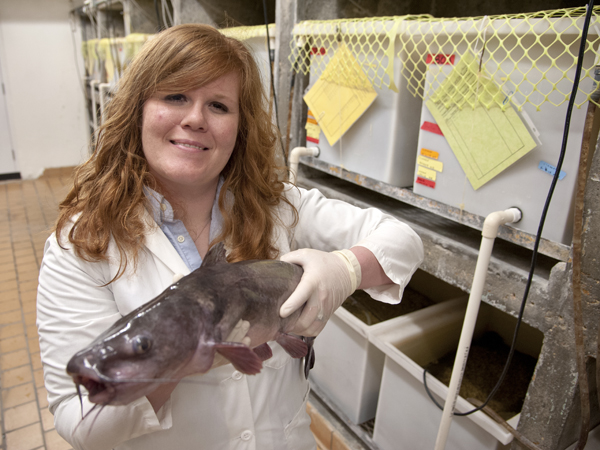#UMMCGrad15: Grad researcher nets catfish study

From corn to catfish Dr. Erin Taylor always has indulged her natural curiosity and dove head-first into research.
The Germantown, Tennessee native studied at Mississippi State University, earning bachelor's and master's degrees in biochemistry. After marrying a Jackson native and moving with him to the state capital, Taylor said she knew she wasn't done with her academic pursuits.
"I knew at that point I wanted to get my PhD, so I applied to this program," said Taylor. The program - Doctor of Microbiology - was in the School of Graduate Studies in the Health Sciences at the University of Mississippi Medical Center.
"I had researched corn with my undergraduate advisor at MSU. I had always been working in an agricultural field up until then," she said. "I don't know if that's why I chose the catfish lab, but when I took the graduate immunology class I was really interested in the area based on that. I knew that's what I wanted to do.
"We use catfish both as a research evolutionary model of the immune system, but also for more practical reasons because catfish is such an important industry here in the state of Mississippi."
During her time working with catfish, Taylor began a project looking into a disease known as the channel catfish virus. "It's a herpes virus that can affect really small catfish called fingerlings. At catfish farms there are a large numbers of those small fish, and this virus can cause up to 100 percent mortality."
Her project received a grant from the United States Department of Agriculture, funding to study a possible cytotoxic cell response to the virus in order to help move toward a potential vaccine.
"They would be able to vaccinate the fish and protect them from this disease. That's a serious economic loss if you lose all your fish in the pond at that age," she said.
While Taylor mentioned the USDA grant in passing, her lab mentor - Dr. Melanie Wilson, professor of microbiology - said it was the first time a student in the lab was awarded this particular predoctoral fellowship.
"As a student, I believe her greatest strengths included her ability to ask and answer the 'right questions' pertinent to her research, her determination and her ability to discuss and present her data in a logical manner," said Wilson. "Also, she was never hesitant to help other graduate students troubleshoot their experiments or talk with the newer students about their class work."
The sentiments were echoed by Taylor's program advisor, Dr. Eva Bengten, a professor of microbiology. "I have frequently seen graduate students from different departments come to Erin for advice and she has been willing to help anyone who is sincere and prepared to work hard. She has high expectations of herself and expects others to rise to the same standards."
Those high expectations helped Taylor win the graduate school's highest honor this year, the Randall-Trustmark Graduate Research Award.
On Friday, Taylor will collect her degree. The following Tuesday, she'll be back at her new gig - a postdoctoral fellowship at UMMC, this time looking into another research field with Dr. Michael Ryan, associate professor of physiology and biophysics and the associate dean of the graduate school.
The opportunity to learn about Ryan's research area - hypertension in lupus - is one she says she's ready to take on.
"I thought this would be something different for me to do, where I can think of immunity in a different model, especially one that is more translational to humans," said Taylor. "Certainly what I've learned here in this lab to be an immunologist helps me in the new position."
As Taylor continues to build on her research history, Taylor said she's where she is meant to be.
"I really want to be in academia, but I want to work at a medical center type of place where there's a lot of research going on."
The freedom that comes with research is one of the aspects she admits drew her to the field in the first place.
"I knew, probably in the middle of college, that I wanted to work in research. I thought I wanted to go to medical school, but I had an advisor at State who gave me a job in her lab and that's what got me interested," she said.
"You're kind of your own boss in a way, this independence to explore what you want to do. I was definitely given that opportunity here in this lab. If I had an idea, they would at least let me try it out for a while. That's what's fun about research is that you're kind of the master of your own destiny in a way."


